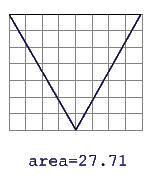


| |
 Bingo! Again all the sides and all the angles are the same size!
Such a
triangle is called a regular or equilateral triangle. As you might have noticed, you
can get exactly one regular triangle if you have a defined perimeter.
Of course this is why: if you have a given perimeter and all the
sides have to be the same length, each side has to be the length
of the perimeter divided by three (in our example each side has
to be 22/3 or 7.33 units long). And since in every triangle all the angles
add up to 180° and all the sides have to have the same angle, each angle
has to be 60°.
Bingo! Again all the sides and all the angles are the same size!
Such a
triangle is called a regular or equilateral triangle. As you might have noticed, you
can get exactly one regular triangle if you have a defined perimeter.
Of course this is why: if you have a given perimeter and all the
sides have to be the same length, each side has to be the length
of the perimeter divided by three (in our example each side has
to be 22/3 or 7.33 units long). And since in every triangle all the angles
add up to 180° and all the sides have to have the same angle, each angle
has to be 60°.
But let's get back to business. We saw that of all the triangles and rectangles, the versions where all the angles and sides are the same, have the biggest area for a given perimeter. This is not only true for rectangles and triangles, but for any possible shape. We call these shapes equilateral polygons.
So, now that we know that the equilateral polygons are always going to give the best result of any polygon, we can take a look at just these and try to find out which polygon gives us the biggest area. Instead of calculating all that stuff, you can again just play around with a magic picture. If you move the mouse around below, the number of sides the polygon has will change. The perimeter always stays 28 units. What relationship do you see between the number of sides and the area?
